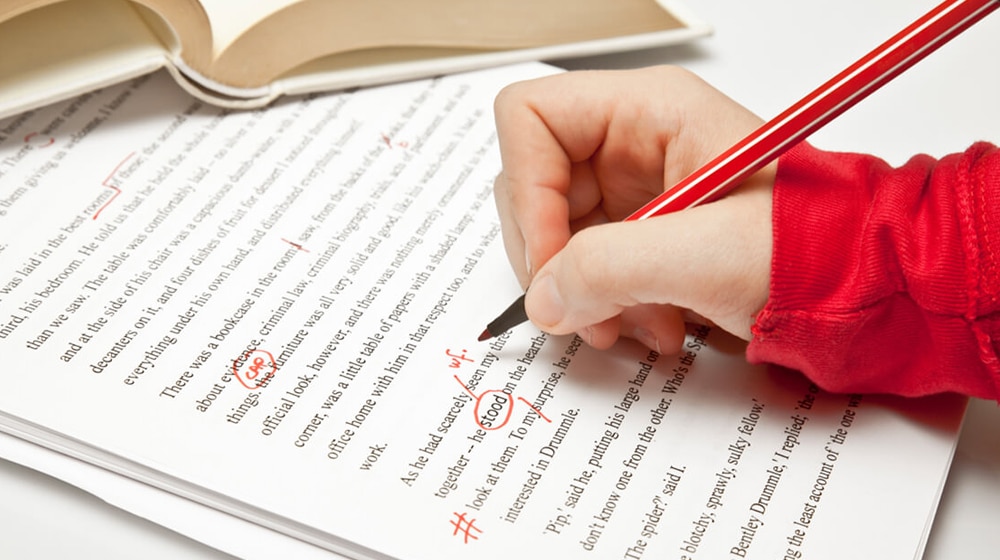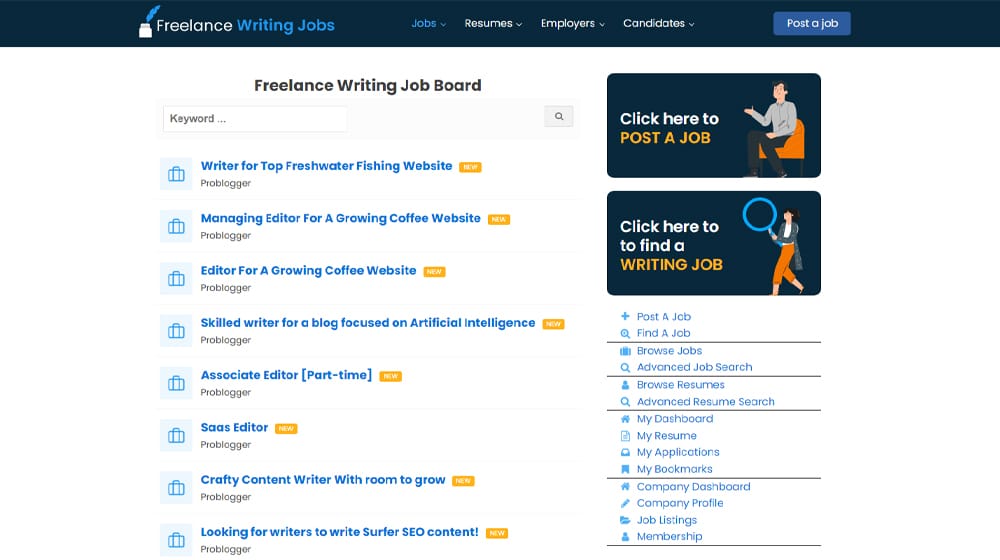While credit for a bestselling book goes to the author, it's no stretch of the imagination to say that without a good editor, nothing of any quality would make it to the shelves. Editors play an invaluable role in ensuring that the content making it to print is as high-quality as it possibly can be, and there's a tangible difference between books that were self-published with no editor and books that had professional editing.
 So, if your book needs editing, it's time to find someone to hire. The only question is, how do you go about it?
So, if your book needs editing, it's time to find someone to hire. The only question is, how do you go about it?Let's dig in!
Yes! Next question.
Alright, that's a little flippant. The answer is still yes, but I'll give it a bit more attention.
Profession editors serve many roles in the publishing process, but the most important of them is as an interface between you and your writing, and the world at large. When you write, you have a story to tell, and you know how you want to tell it. An editor knows what a publisher is going to want, what an audience is going to want, and how to smooth it all over.
 Most importantly, an editor can push back, smooth over, and streamline your book. They can tell you that a given chapter sucks and will lose you readers, or when something you've written doesn't fit with the rest of your piece, or when an event is unsatisfying. They can give you suggestions, rearrange portions of your story, and much more. Their job is to spot things that you didn't.
Most importantly, an editor can push back, smooth over, and streamline your book. They can tell you that a given chapter sucks and will lose you readers, or when something you've written doesn't fit with the rest of your piece, or when an event is unsatisfying. They can give you suggestions, rearrange portions of your story, and much more. Their job is to spot things that you didn't.
Obviously, an editor isn't an omnipotent decision-maker. You can always choose to defend your choices, explain why they're important, and demand to keep them as-is. In some instances, this is fine; the editor just wanted justification. In others, the editor might push back further, explaining why it just wouldn't fly with a publisher or with your intended audience. In some rare cases, it might be a strong enough difference in opinion that the editor decides to stop working with you.
In any case, editors have a much more important role than just checking over your book for typos and grammatical errors. Their services are indispensable for even professional authors (and you can usually tell when an author gets famous enough they think they no longer need an editor, and the quality of their books drops significantly), and they can significantly smooth the way to publication.
"Editor" means many things, and it's important that you know what kind of editing you need before you go looking for an editor to hire. Generally, editing falls into four main categories, though some professional editors can perform more than one of these services at a time.
The first is copyediting/proofreading/polishing. These editors look for typos, grammatical errors, issues in the writing, and other problems. If you've ever been writing and gotten distracted partway through a line and come back later, you know that sometimes there's a disconnect, or you forget to finish the thought. These editors can find instances like that and smooth them over. Typically, when you hire an editor, this isn't the service you're asking for, at least not at first. You can also partially replace this kind of editor with programs like Grammarly, though no machine can replace a dedicated human mind.
The second kind of editing is line editing. Line editing goes through a work line by line and paragraph by paragraph. It looks for things like repetitive sentence structure, inconsistent logical flow, lack of conclusion, and general disconnection in the content. This can be lumped in with polishing by many professional editors and done mostly at the same time.

The third kind of editing is content editing. It's a higher-level kind of editing, looking at the overall tone, style, progression, and logic of a piece. These are the people who might tell you that a particular scene isn't adding anything to the piece, that the conclusion of a fight scene isn't satisfying, or that there's a plot hole you forgot to address. For more nonfictional content, it looks for factual inaccuracies, incorrect or unsupported conclusions, and fact-checking.
The fourth kind of editing is developmental editing, and it can take place before you've even finished the first draft. They can take an outline and offer critique, and help you build up the total overarching content of your book along the way. It's the most involved, long-term relationship with an editor for a book and, consequently, the most expensive.
Picking the kind of editing you need will be an important part of finding a good editor.
Another choice you need to make is whether you're going to go with a freelance editor or one that works with an editing agency. You may also have the option of working with an editor who is themselves employed by a particular publisher.
Freelancers don't necessarily have ties with agents or publishers. They sell their services as an editor, polishing up your book for you and with you, and that's it. They may be able to refer you to agents they know, but they don't have connections or leverage to help you get published. On the plus side, these editors are often quite cheap compared to other options.

Publisher-employed editors are generally not available to work with you unless you already have a contract with the publisher. That means you need to find an agent and publisher on the strength of your own writing and draft, or you need to work with a professional editor ahead of time and end up with double the editing (which might also be contradictory; editors can have different opinions, after all.) On the plus side, you might not need to pay for this service since it comes as part of the contract you sign with the publisher.
Agency editors are employed by big editing companies and tend to have more standardized and less personal editing. However, they also generally have higher levels of skill and attention to detail. Agencies can be hit or miss, but if you find one that you can work with well, it can be an excellent relationship to foster.
A critical decision you need to make before hiring an editor is knowing explicitly where your lines are drawn. There's nothing worse for the writer or for the editor than signing up for a business relationship and not being able to work together.

If you're particularly attached to a plot the way it unfolds, tell the editor up-front that you're only looking for technical editing and not developmental editing. Conversely, if you're open to changing anything and want a professional opinion on improving everything from technical proficiency to overarching plotlines, you don't want to end up with an editor that points out typos and nothing else.
Editing is trickier to price than writing, particularly when the kind of editing involves greater detail and revision. A per-word rate works for line editing and polishing, but it doesn't really work for developmental editing. For those kinds of projects, you're more likely to be paying per hour.

This can be important because, when you test an editor to see if they're the right person to work with, you'll generally pay for a trial run. It might be a per-word rate for the first few chapters, or it might be a per-hour rate for 2-5 hours of editing work. Either way, you definitely want to pay for that trial run if you want to get the attention of actually good editors.
As far as pricing is concerned, editing can range anywhere from $20 an hour up to $300 an hour. Temper your expectations accordingly.
Finding a good editor is about more than just an editor with skills or an editor who has worked on popular books in the past. A good editor can improve your chances of success, but they aren't a golden ticket to the bestseller lists.

When looking for an editor, consider details such as:
Don't be afraid to re-evaluate and decide that the relationship with an editor isn't working out. There's a non-zero chance they feel the same, and as long as you pay for the services rendered, there won't be any hard feelings.
Finding an editor for hire can be tricky. They're out there – they're everywhere – but like writers, they're often somewhat introverted and may not be the best at promoting themselves. So, you need to know how to find editors you might want to hire.
The first option is agencies. Companies like Book Editing Associates and BookBaby provide editing services, often for a flat fee based on the kind of editing you want. You don't necessarily get to pick (or even talk to) the editor; you just submit a document and receive feedback. It can be impersonal, but at least it's guaranteed.
The second option is marketplaces. Sites like Upwork and Reedsy allow you to register to browse their network of freelancers. You can then approach one you think looks good, pitch them your project, and negotiate the details if they're available. It can be tricky to find an editor you think you can work with, but it's a much more personal relationship than an agency editing.
The third option is to look for an editor via their own networks. For example, pro editor Staci Frenes has a brand site of her own, and many freelance editors like Elise Gallagher maintain LinkedIn profiles. Many of these editors also maintain profiles on the marketplaces as well, so you'll see a few familiar names crop up more than once in your search. You can also find public lists of editors like this one.
A fourth option is editing societies that may connect you with their editors or offer directories. Societies include:
Contacting an editing society can get you in touch with many potential editors, though they don't always offer connection services.

Finally, you can always post your editing needs as a job listing on sites like Flexjobs or even this very site. Sometimes, rather than going out to find an editor, you can post an opportunity and let them come to you. Posting a job ad for editing is a little trickier because you need to comb through and vet applicants and pick one to trial, but it can be a better, more passive method for those who don't know how to pick an editor in the first place.
Once you've found a promising editor, pay for a trial run of their services, whether that means a few hours or a few pages. From there, decide if they're someone you can work with, and set up a contract. Once that is good to go, you'll be able to proceed with getting the whole of your book edited.
Then comes the hard part: fixing all of your mistakes and issues, smoothing out the whole book, and finally starting to query it to publishers for publication. Good luck! Hopefully, you won't need it. If you have any questions, please feel free to reach out! I'd be more than happy to help you out!